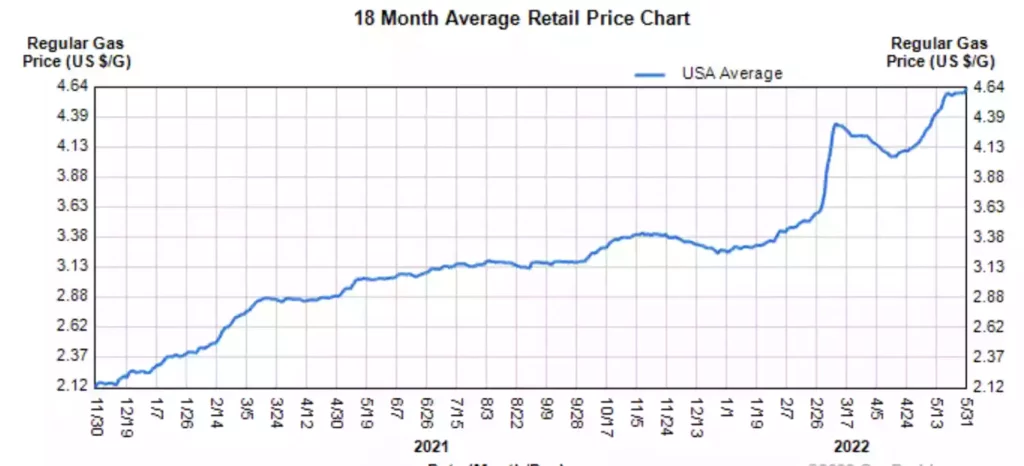How an economic downturn will impact middle-market businesses
How an economic downturn will crush middle-market businesses. PPP money is being exhausted, business maybe spent their resources on the wrong thing, and the capital market is tight.
The economy is in flux. How will this affect middle-market businesses? This blog post will look at potential causes of an economic downturn and steps you can take to protect your business.
Are you worried about the economy?
It’s no secret that the economy is in a state of flux. The question on everyone’s mind is, how will this affect middle-market businesses?
This blog post will look at some of the potential causes of an economic downturn and what steps you can take to help protect your business. Stay tuned for more information!
The numbers

- Gas hit an all-time high in May, it clocked in at $4.62, and diesel is higher.
- Inflation hit an all-time high an 8.2%
- Labor costs are on the rise
You don’t have to worry about the economy anymore. This blog post will look at some of the potential causes of an economic downturn and what steps you can take to help protect your business. Stay tuned for more information! We’ve got you covered.
Click this blog post now and learn how to protect your business from an economic downturn!
What is an economic downturn, and what causes it?

An economic downturn is a period of time when the economy is performing poorly. This can be caused by various factors, including political instability, bad economic policies, high levels of debt, or large trade deficits.
You can take several steps to help protect your business during an economic downturn. One of the most important is to save money. This can help you maintain liquidity and reduce your vulnerability to financial shocks.
In addition, you should invest in technology to eliminate waste and make your business more efficient. Having a professional consulting firm look for performance gaps in human capital, technology, and strategy can help you prepare for the worst-case scenario. Finally, you should work to control costs, increase quality, and lower risk factors.
How will this affect middle-market businesses?
How will an economic downturn affect middle-market businesses?
There are several ways that an economic downturn can affect these businesses. One of the most important is that it can reduce consumer demand. This can lead to decreased sales and profitability.
An economic downturn can also lead to higher unemployment rates and reduced investment. This can cause businesses to lay off workers, decreasing productivity and increasing costs.
Finally, an economic downturn can lead to increased financial stress. This can lead to business failures and decreased job security.
So, what can you do to protect your business from a recession?

One of the most important things you can do is save money. This will help you maintain liquidity and reduce your vulnerability to financial shocks. In addition, you should invest in technology to make your business more efficient.
Having a professional consulting firm look for performance gaps in human capital, technology, and strategy can help you prepare for the worst-case scenario. Finally, you should work to control costs, increase quality, and lower risk factors.
By taking these steps, you can help protect your business from the potential effects of an economic downturn.
The Worst-Case Scenario for Middle-Market CEOs

What is the worst-case scenario for middle-market CEOs?
The worst-case scenario for middle-market CEOs is a severe economic downturn that causes a significant decline in sales and profitability. This can lead to layoffs, business failures, and decreased job security.
It is important to save money, invest in technology, and have a professional consulting firm look for performance gaps to protect your business. You can help reduce your risk of experiencing the worst-case scenario by taking these steps.
Are you worried about how an economic downturn will impact your business? If so, you’re not alone. Many middle-market CEOs are concerned about the potential effects of a recession.
While it’s impossible to predict the future, there are several steps you can take to help prepare for the worst-case scenario. These include saving money, investing in technology to eliminate waste, and having a professional consulting firm look for performance gaps in human capital, technology, and strategy.
In addition, you should work to control costs, increase quality, and lower risk factors. By taking these steps, you can help protect your business from the potential effects of an economic downturn.
5 Steps on how to prepare for an economic downturn
An economic downturn can be a difficult time for businesses. Sales may decline, unemployment may rise, and financial stress may increase.
If you’re worried about how an economic downturn will impact your business, here are five steps that you can take to help prepare for the worst-case scenario:
- Save money – Saving money is one of the most important things to protect your business during a recession. This will help you maintain liquidity and reduce your vulnerability to financial shocks.
- Invest in technology – Investing in technology can help you make your business more efficient and reduce waste. This can help you save money and improve your profitability during a recession.
- Have a professional consulting firm assess your business – A professional consulting firm can assess your business and identify potential performance gaps in human capital, technology, and strategy. This can help you prepare for the worst-case scenario and mitigate the effects of a recession on your business.
- Control costs – It is important to control costs during a recession to maintain profitability. Some ways to reduce overhead costs are streamlining operations and renegotiating contracts with suppliers and vendors.
- Lower risk factors – There are a number of risk factors that can impact your business during a recession. These include high levels of debt, large trade deficits, and political instability. You can lower these risk factors by investing in risk management and insurance.
- By taking these steps, you can help protect your business from the potential effects of an economic downturn. While there is no guaranteed way to avoid the worst-case scenario, preparing for a recession can help you weather the storm and come out ahead.
How to Control Costs in a Bad Economy
It is more important than ever to control costs in a bad economy. Here are four tips for doing so:
- Reduce overhead costs – One of the best ways to control costs is to reduce overhead expenses. This includes things like rent, utilities, and staffing costs. You may need to consider downsizing your office, renegotiating utility contracts, and reducing staff levels.
- Streamline operations – Streamlining operations can help you reduce costs and improve efficiency. This includes simplifying product lines, standardizing processes, and automating tasks wherever possible.
- Renegotiate contracts with suppliers and vendors – Many businesses renegotiate contracts with suppliers and vendors to get better pricing during a recession. This may include renegotiating terms, lower prices, or longer payment terms.
- Invest in risk management and insurance – Investing in risk management and insurance can help protect your business from the risks associated with a recession. This includes property insurance, liability insurance, and business interruption insurance.
You can help control costs in a bad economy and maintain profitability during difficult times by following these tips.
Increasing Quality and customer support during tough times
It is more important than ever to maintain high-quality standards and provide excellent customer service in a recession. Here are four tips for doing so:
- Maintain high-quality standards – It is vital to maintain high-quality standards during a recession. This will help you differentiate your business from the competition and attract new customers.
- Increase customer support – Customer support is critical during tough times. This includes providing customer service through multiple channels, offering incentives for referrals, and providing customer support 24/7.
- Train employees in customer service – It is important to train employees in customer service to provide the best possible experience to your customers. This includes things like training on products and services, how to handle complaints, and how to deal with difficult customers.
- Use technology to improve customer service – Technology can help you improve customer service by providing real-time information about customers, automating tasks, and helping you track customer satisfaction levels.
By following these tips, you can increase quality and customer support during tough times and improve the competitive position of your business.
Lowering Risk Factors in a Turbulent Economy
There are a number of risk factors that can impact your business during a recession.
These include high levels of debt, large trade deficits, and political instability. You can lower these risk factors by investing in risk management and insurance.
By taking these steps, you can help protect your business from the potential effects of a turbulent economy. While there is no guaranteed way to avoid the worst-case scenario, preparing for a turbulent economy can help you weather the storm and come out ahead.
3 middle market companies are examples of how an economic recession kills mid-market businesses
- Reducing overhead costs – One of the best ways to control costs during a recession is to reduce overhead expenses. This includes things like rent, utilities, and staffing costs. Mid-market businesses often need to downsize their offices, renegotiate utility contracts, and reduce staff levels. Don’t let profits weak.
- Declining customer demand – Another common problem for mid-market businesses during a recession is declining customer demand. This can be due to several factors, such as economic uncertainty, layoffs, and budget cuts. As a result, businesses may need to offer incentives for referrals or discounts to attract new customers.
- Difficulty obtaining credit – A third issue that mid-market businesses often face during a recession is difficulty obtaining credit. This can be since banks are less willing to lend money during tough times. As a result, businesses may need to seek alternative financing options or delay making important investments.
Here is the middle-market companies list that will be impacted by restaurants, technology, hospitality, and other discretionary spending industries. Don’t let your business slip back into a small business. You have worked too hard to get here.
Conclusion
Recessions can be difficult for businesses of all sizes, but they can be especially challenging for mid-market businesses. By following the tips in this article, you can help reduce the impact of a recession on your business.
This includes reducing overhead costs, increasing customer support, and investing in risk management and insurance.
While there is no guaranteed way to avoid the worst-case scenario, preparing for a turbulent economy can help you weather the storm and come out ahead.
Matrix Marketing Group can help. Since 2002, we have weathered many business cycles and helped hundreds of businesses become bullet-proof.
General FAQs
What is an economic downturn?
An economic downturn is a period of time when the economy is doing poorly. This can be due to several factors, such as high levels of debt, large trade deficits, or political instability. As a result, businesses may need to offer incentives for referrals or discounts to attract new customers.
What are the possible causes of an economic downturn?
There are a number of possible causes of an economic downturn, including high levels of debt, large trade deficits, and political instability. In addition, bad economic policies or a natural disaster can also lead to a recession.
What are the effects of an economic downturn on businesses?
An economic downturn can have a number of negative effects on businesses, including reduced customer demand, difficulty obtaining credit, and declining profits. As a result, businesses may need to reduce costs or lay off staff to stay afloat.
How can mid-market businesses prepare for a recession?
There are a number of things mid-market businesses can do to prepare for a recession. Look at controlling costs, increasing quality, and lowering risk factors. This includes saving money, investing in technology to eliminate waste, and having a professional consulting firm look for performance gaps in human capital, technology, and strategy

